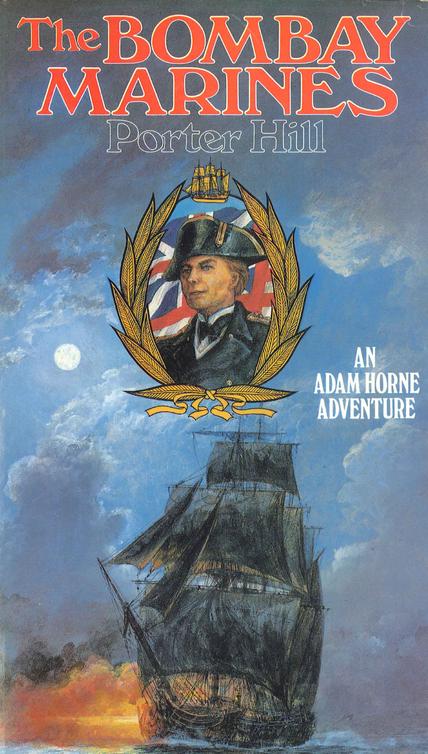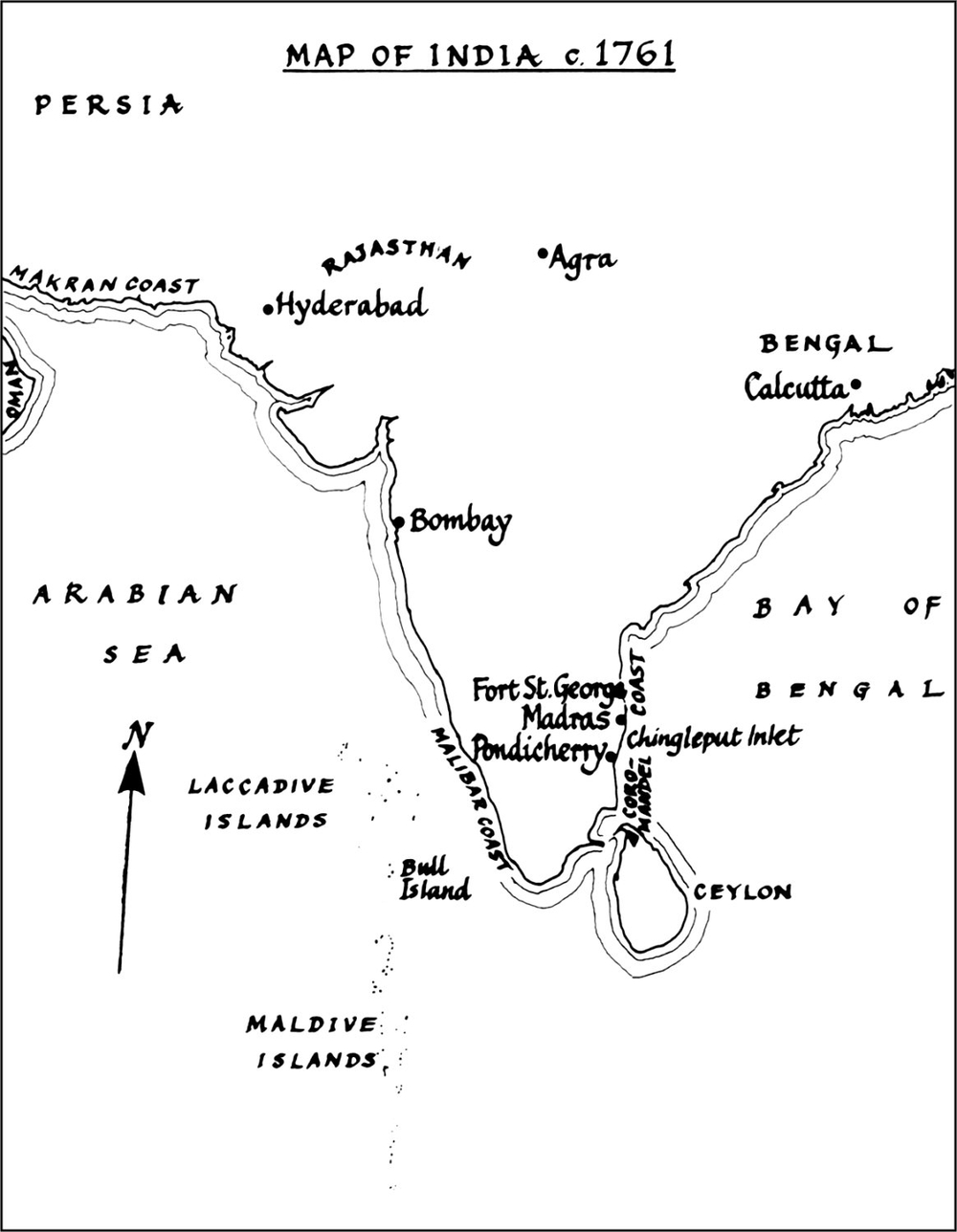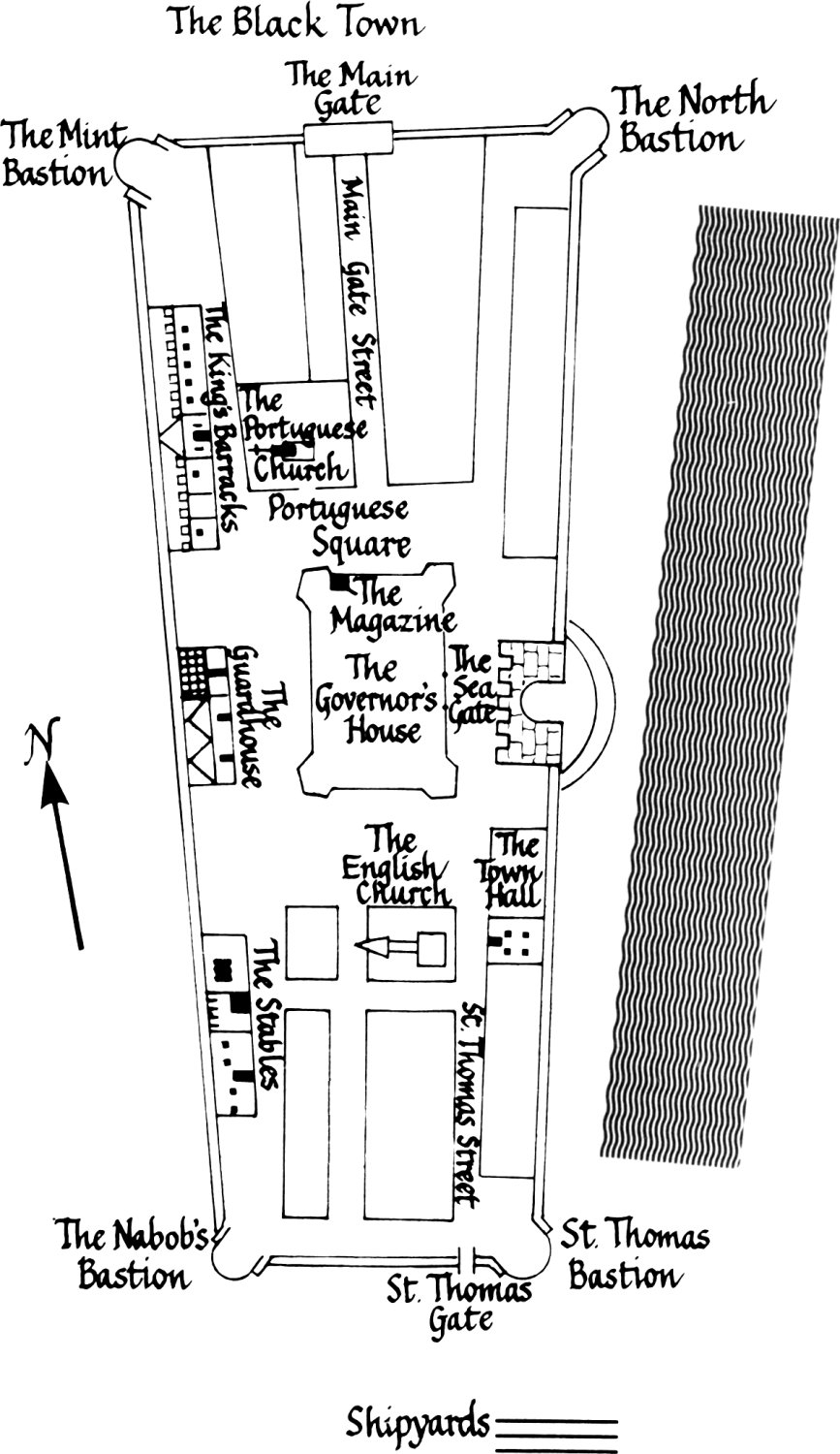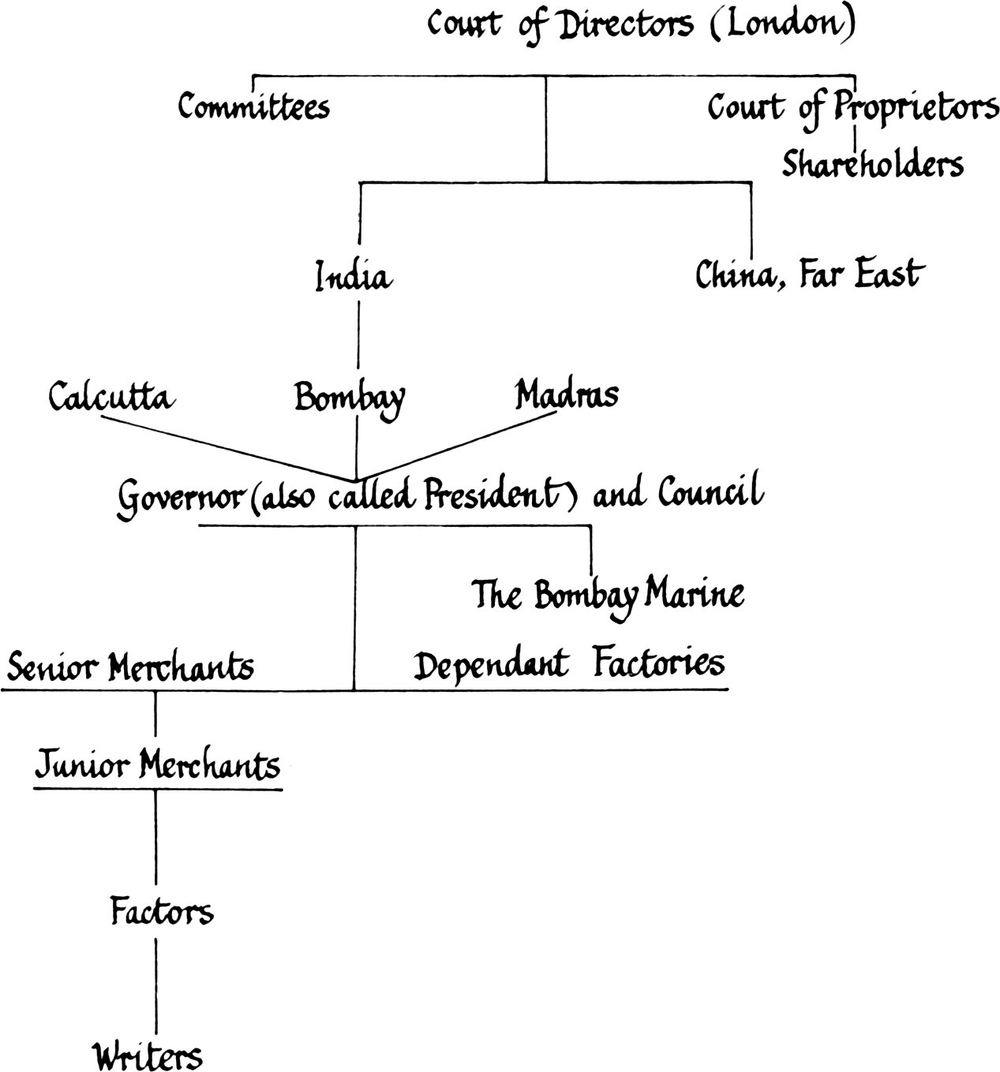The Bombay Marines
Read The Bombay Marines Online
Authors: Porter Hill


MARINES
a novel
by
PORTER HILL
SOUVENIR PRESS
Dedicated
to
the
living
spirit
of
Billie
Ann
France’s surrender of Pondicherry to England in 1761 lost all hope of a French colonial power in India. Both nations signed the Treaty of Paris two years later, ending the conflict which became known to history as the ‘Seven Years War’.
Porter Hill
- Title Page
- Dedication
- Maps and Diagrams
- Part One:
ROUGH ORDERS - 1 Bombay Castle
- 2 A Quick Mind and Strong Body
- 3 The
Eclipse
- 4 Roll Muster
- 5 ‘Clear For Action’
- 6 Angria’s Reef
- 7 A Bad Dream
- 8 Bull Island
- 9 The Three Governors
- Part Two:
THE WHEAT FROM THE CHAFF - 10 The Hard Way
- 11 Bite If You Can’t Kick
- 12 Burn In Hell
- 13 The Chosen Few
- 14 The Mystery Ship
- 15 True Colours
- 16
La
Favourite
- 17 The Ceremony
- Part Three:
INTO THE FORTRESS - 18 The Convoy
- 19 The Coromandel Coast
- 20 The Donkey Cart
- 21 A Tamil Trader
- 22 The Untouchables
- 23 The Madras Roads
- 24 Fort St George
- 25 Old Acquaintances
- 26 The Town Major
- 27 The English Bells
- 28 The Wild Geese
- Afterword
- Glossary
- Copyright
- The Adam Horne trilogy



T
he south-easterly breeze off the Arabian Sea fluttered three flags run up high on the battlements of Bombay Castle. The first flag was England’s Union Jack. The second was the red-and-white striped standard of the Honourable East India Company with the Union Jack squared in the upper left corner. The third flag was a duplicate of the East India Company’s colours except for a dominant red cross marking it as the ensign of the Company’s private fighting unit – the Bombay Marine.
Captain Adam Horne paced a long hallway within the stone castle, his head bent forward, both hands gripped behind his back, waiting for an interview with Marine Commander-in-Chief, Commodore Watson.
Adam Horne had returned to Bombay less than twenty-four hours earlier. His frigate, the
Eclipse,
thirty-four guns, had been assigned to put an end to the Maratha pirates plaguing the East India Company’s trading routes between Hyderabad and Persia. He carried a report of success in his pocket.
Horne’s commission as captain was recent. The assignment to the North Arabian Sea had been his second appointment aboard the
Eclipse.
But today was the first time for him to submit a written report to the Commander-in-Chief.
Pacing the hallway, he wondered if he had written too much about his land attacks against Singee Ranjee’s encampment. Would Commodore Watson be concerned with
terrain details? Might a man with Watson’s naval background prefer to be informed mostly about encounters at sea?
Reaching the end of the hallway, he raised his head and saw himself reflected in a tall, gilt-framed mirror. Leaning closer, he studied the creases forming around his eyes. He was not displeased by what he saw. Creases made him look older than his twenty-seven years, more mature than when he had left Bombay fourteen months ago, and a completely different person than the belligerent young man who had come out to India from England seven years ago, lonely, unhappy, looking for a new life.
Reaching up to his forehead, he tucked a tangle of chestnut hair under the front of the cocked hat. He believed that he looked more serious – less jaunty – when his hair did not tumble over his forehead. However, there was no way he could stop it curling in the sea air.
Adam Horne was a tall man, standing just over six feet. But he felt that his shoulders were too wide for the physical proportions of his angular body, giving him the look of a brute, and making him the first man a drunkard picked a fight with in a tavern. The passing years had taught him to accept such challenges less enthusiastically, sometimes even trying to discourage the fight.
Straightening his stance in front of the mirror, Horne’s eyes dropped to the new dress uniform which had been tailored for him during his absence from Bombay, a coat and breeches that he wore for the first time today. What would a young lady make of him attired in this blue frock coat decorated with gold epaulettes and high-standing collar; the silk shirt with its long, winding stock; the pair of tied breeches and tall, black, horseleather boots? The East India Company had copied the uniform from His Majesty’s Royal Navy. Horne suspected that a Marine officer’s wife had been instrumental in the decision, some English woman who regretted that her husband was not in His Majesty’s Forces and wanted him to look dashing despite
the fact that he was attached to the badly disciplined, down-at-the-heel unit referred to with sniggers as the ‘Bombay Buccaneers’.
Adjusting the gold and silver hilt of the sword hanging from his belt, Horne turned from the mirror, hoping that the East India Company did not have too many other changes planned for the Bombay Marine. If he had wanted an easy, dashing life, he would have joined one of the Forces considered to be gentlemanly and civilized, such as the Royal Navy, or the East India Company’s Maritime Service which manned the Company’s mammoth merchant ships. He resumed his pacing of the hallway, wondering about his future with the Marine. Would he continue having the independence and freedom of manoeuvre he had had in his last assignment?
The Marine’s primary function was to protect the Company’s trading routes. But war raged with France, with the fighting now centralized on the opposite side of the Indian sub-continent from Bombay, and more than half of the Marine’s nine frigates and ten peak-sailed gallivats had already been sent to join the Royal Navy in the Bay of Bengal. Horne feared that the
Eclipse
might suffer the same fate.
The click of a door latch attracted his attention. Turning, he saw Commodore Watson’s secretary, Lieutenant Tod-well, step out into the hallway.
‘Captain Horne?’
‘Lieutenant.’ Horne reached towards the sealed report bulging his pocket.
‘Commodore Watson will see you now, Captain Horne.’
Horne stepped in front of Lieutenant Todwell, nodding, fleetingly imagining the lean, sallow-cheeked secretary as a possible subordinate aboard the
Eclipse
. A shortage of manpower in the last fourteen months had taught him not to eliminate anyone as a potential recruit.
* * *
Commodore Watson, a big man with bushy eyebrows, fat
jowls and a sunburnt nose, sat under the rattan sweeps of a
punkah
fan moving back and forth above his desk. Adam Horne’s written report – its wax seal unbroken – lay amongst other official documents. Commodore Watson leaned back in his chair, dabbing a cotton square at the fleshy folds of his neck as he listened to Horne recounting the events of the last fourteen months. Occasionally he interrupted Horne to ask for details, information about land manoeuvres, how Horne had led his Marines against Singee Ranjee’s mud fortress and strongholds in the Talar-i-Band Mountains. Watson grimaced when Horne told him about losing fourteen men in a late-night skirmish against a pirate camp east of Sonmiani Bay; he nodded approvingly when Horne explained that he had been forced to select men from the frigate’s crew to supplement his Marine squadron; he smiled when Horne added that sailors made sad, clod-hopping Marines.
Raising one hand, he rasped in his hoarse, throaty voice, ‘Did lack of manpower hold you back, Horne?’
Horne considered the question. ‘I believe, sir, I would have suffered fewer casualties with more fighting men.’
‘But you accomplished your mission?’
‘Yes, sir.’
‘Those brown-skinned devils won’t be troubling the Company again?’
‘No, sir. Not in this life.’ Horne’s voice was deep-chested but soft, surprisingly mellow for a man of his size.
‘So you weren’t …
disabled
by lack of manpower?’
‘No, sir.’
Watson’s watery blue eyes remained fixed on Horne; he appeared to be assimilating his next question.
Finally nodding, he said, ‘Good. Excellent. Now I can tell you about the French.’
The French? Horne did not understand. How did the French follow questions about manpower? Was Watson sending him to join the Navy blockade in the Bay of Bengal?
‘Horne, the French surrendered Pondicherry.’
Pondicherry was France’s one remaining stronghold on the west coast of India. Horne knew, too, that the defeat of Pondicherry could mean the end of the war, at least here in India.
Watson elaborated. ‘General Lally surrendered two weeks ago: the sixteenth of January to be precise.’
General Thomas Lally was a hot-headed Irishman who served as France’s Commander-in-Chief in India, a man with a reputation for being a keen strategist. Horne had also heard quarterdeck gossip that General Lally was a drunkard, a tyrant and an insufferable snob.
Watson fanned his face with the cotton square. ‘I’m under strict orders, Horne,’ he confessed, ‘not to discuss Lally’s surrender except to say …’
Horne noticed that Watson’s forehead had beaded with perspiration, that his voice had lowered to a croak rather than a rasp, that he appeared to be troubled.
‘Horne, the Governors of the Honourable East India Company have ordered the Bombay Marine to form a special squadron. The assignment is to be of the highest secrecy. From what I know of your record, and from what you’ve told me about this last mission, I know I’m right in thinking you’re the man to take that squadron into Fort St George.’
Horne understood now why Watson had surprised him and was asking so many questions about land attacks: the Governors were sending Marines into the Company’s best fortified post in India. But why?
‘You will begin preparing a squadron immediately, Horne.’
Horne thought again about lack of manpower.
‘I cannot say exactly how large the squadron must be, Horne. I can only tell you that your orders are to move General Lally from Fort St George to a merchantman sailing for England.’
‘“Move”?’ Horne did not understand. ‘“Move” as an escort, sir?’
Watson’s smile was thin, almost mocking.
‘No, Horne. The action should prove to be a little more … lively than an escort exercise. Unfortunately, the only thing I can tell you about it at this juncture is that General Lally is being held as a prisoner-of-war in Fort St George.’
‘Excuse me, sir, but I’ve heard that Admiral Pocock joined Colonel Coote in the siege of Pondicherry. Does that mean that the Navy holds Lally prisoner with the Army?’
Watson opened his mouth to protest at Horne’s question. But pushing back his chair, he rose from the desk, saying in a burst of amazement, ‘Damn it, Horne. You find your way straight to the puzzle, don’t you?’
Puzzle? What puzzle? Horne had asked what he considered to be an obvious question – whose prisoner was Lally? The Army’s or Navy’s or both?
Beginning to pace the rich oriental carpets layered on the floor of his chamber, Watson proceeded. ‘I repeat, Horne, that I am not allowed to divulge any information to you about Lally’s surrender. You will be given all necessary details in due course. In the meantime, you must act with the greatest care in preparing your squadron.’
He glanced over his shoulder at Horne. ‘You must not confide in your men about the nature of this mission. Not until you have final orders to enter the fortress.’
‘I understand, sir.’
Watson wadded the handkerchief, dabbing at his jowls and neck. ‘The Lord forbid that Colonel Coote and the Army should suspect the Company’s actions. There’ll be the devil to pay, too, if Admiral Pocock and the Admiralty get wind of this plan.’ He mopped the handkerchief across his sun-blotched pate. ‘The devil to pay.’
Commodore Watson, the Commander-in-Chief of the Bombay Marine, was frightened of both the Army’s Colonel Coote and the Navy’s Admiral Pocock. Horne was certain of it, and surprised. Commodore Watson was usually stubborn, demanding, firmly set in his ways, a blustery old
walrus. So there must be good reasons for his sudden change of character.
Remembering Watson’s calmness at the outset of the interview, Horne recalled how the jowled old Commodore had only become nervous when he had begun talking about Lally’s imprisonment at Fort St George.
Horne could think of only one reason for Watson’s nerves: the Governors of the East India Company had ordered the Bombay Marine to
kidnap
Lally from his prison at Fort St George. And if the British Army or Navy were holding the French Commander-in-Chief as a prisoner-of-war, such action would, of course, be high treason.
* * *
The air in Commodore Watson’s chamber remained humid and uncomfortable, despite the slight breeze raised by the
punkah
fan as it swept back and forth. Watson moved from his desk to the window, nervously mopping his brow. ‘You should be aware, Horne,’ he explained, ‘that your orders will continue to be verbal. You must understand, too, that if you or any of your men are apprehended during this assignment – seized and arrested either by the Army or Navy – the East India Company will not come to your defence. The Governors will deny all orders concerning Thomas Lally.’
To be disowned by the Company’s three Governors on a mission of their assigning neither surprised nor angered Adam Horne. His father was a London merchant banker; he had learnt from boyhood that all trading companies and their servants were by nature self-serving.
Watson’s voice was regaining some of its rasping assurance, its bark. ‘I too will deny any knowledge of your activities at Fort St George.’
‘Yes, sir.’
Horne disliked officers abandoning their men. But he was relieved to hear that he was not going to be dispatched
to join the Navy’s blockade, that he would be operating independently of superiors – regardless of the assignment’s mysterious nature.
‘You’re to look for no outside help at any point of the mission, Horne. Do you thoroughly understand that point?’
‘Yes, sir.’ Horne sat stiffly in the straight-backed chair, his cocked hat resting on his left knee.
‘Any man apprehended during the mission shall be brought before a Court of Inquiry. The charge would be treason.’
The mention of treason reminded Horne of his suspicions that the Company’s Governors were sending the Bombay Marine to kidnap a prisoner-of-war. Could he possibly be right?
Watson stood in front of the window cut into the castle’s south wall, high above the harbour, the busiest trading port in the Arabian Sea. ‘Horne, I learned only yesterday that a storm struck the Coromandel Coast while Lally was negotiating his surrender. I tell you this because in November I despatched the remaining three Bombay ships to Pondicherry and I’ve had no word of them being amongst the survivors. You probably have friends or old shipmates aboard the lost frigates and will hear of it. I also want you to know this fact because it means I cannot spare you one single man.’
Instead of dwelling on the thoughts of friends lost at sea, or the chance that he might have been one of them, Horne took what seemed like the one millionth count of men aboard the
Eclipse.
‘Sir, the
Eclipse
was undermanned when I last set sail from Bombay. When you read my report, you will see that a total of twenty-two men were killed in battle. A further seven men died from yellow fever.’
Watson remained by the window. Below him brightly striped tents stretched along the stone wharf. Snub-nosed native craft and Malabar sailing boats swarmed amid the din
of voices, bells and vendors’ cries. Keeping his eyes on the colourful harbour confusion, he asked, ‘What’s your present crew, Horne?’